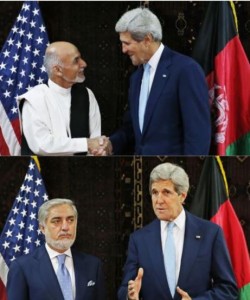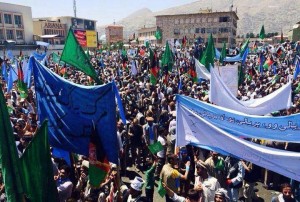Afghan Vote Audit Farce Nears Conclusion
Reuters carries a hopeful headline this morning, “Afghan rivals said close to ending feud on how to share power“, where they inform us that the elusive power sharing agreement between Ashraf Ghani and Abdullah Abdullah may finally be reached tonight:
Afghanistan’s rival presidential candidates may reach a deal on how to share power late on Tuesday, according to Afghan and Western officials, potentially ending months of tension over the outcome of a run-off election held in June.
The struggle to find a successor to President Hamid Karzai, who has held power since the Islamist Taliban were ousted in 2001, has destabilized Afghanistan and paralyzed its economy just as most foreign troops withdraw.
There clearly is a push to say that a resolution of the crisis is close. ToloNews claims that a meeting last night between the candidates hosted by Hamid Karzai “went well, and both men were said to have reaffirmed their commitments to resolving their differences and reaching an agreement soon”. However, reading further in the article, we see that fundamental differences remain:
Both teams have confirmed that the candidates have discussed a new plan for the national unity government they agreed to form back in August following meetings with U.S. Secretary of State John Kerry. According to Abdullah’s camp, the two campaigns have agreed that the Chief Executive will serve as the Chairman of the Council of Ministers.
“An agreement has been made on one of the disputed points regarding whether the Chief Executive will also serve as Chairman of Council of Ministers,” Abdullah spokesman Syed Aqa Fazel Sancharaki said Monday.
Meanwhile, the Ghani campaign has maintained that the elected president will serve as head of government and Chairman of the Council of Ministers. “The presidential order will certify the job descriptions of the Chief Executive and his vices and the elected president will be head of the government and Chairman of Council of Ministers,” Ghani spokesman Faizullah Zaki said on Monday.
To underline just how farcical the entire process of “auditing” the runoff vote ballots became, another ToloNews article this morning is stunning in its open admission of how widespread fraud was in the election. The Independent Election Commission announced that results from 1028 polling places have been rejected in the audit process:
During the announcement, IEC acknowledged the fact that the June 14 run-off elections witnessed massive frauds.
“There was wide-scale fraud by security forces, governors and IEC employees,” a commissioner for the IEC, Azizullah Bakhtyari, admitted. “Clearly, most of the fraud happened in coordination with IEC employees.”
Bakhtyari hopes that the audit process will re-establish people’s trust in the election process.
“The audit helped us recognize the employees responsible for the fraud that took place at the 1,028 polling sites,” he said. “Clearly, we will take action against them for harming the public’s trust in the electoral institution.”
Wow. So security forces, governors and IEC employees all took part in the fraud? Those are the very people who were supposed to assure voters that the process would be fair and impartial. But don’t get the impression that this admission and the tossing of results from 1028 polling stations will change anything. Although that sounds like a lot of votes being tossed, keep in mind that there were around 22,000 polling stations, so this move will have very little impact on the final vote tally.
What is clear is that this final adjusted vote tally will have to be announced soon. What is not clear is whether Abdullah will accept the result that is certain to say that he lost. Just how he and his supporters react to the final announcement will be the most important decision in Afghanistan’s fate over the next few years.


